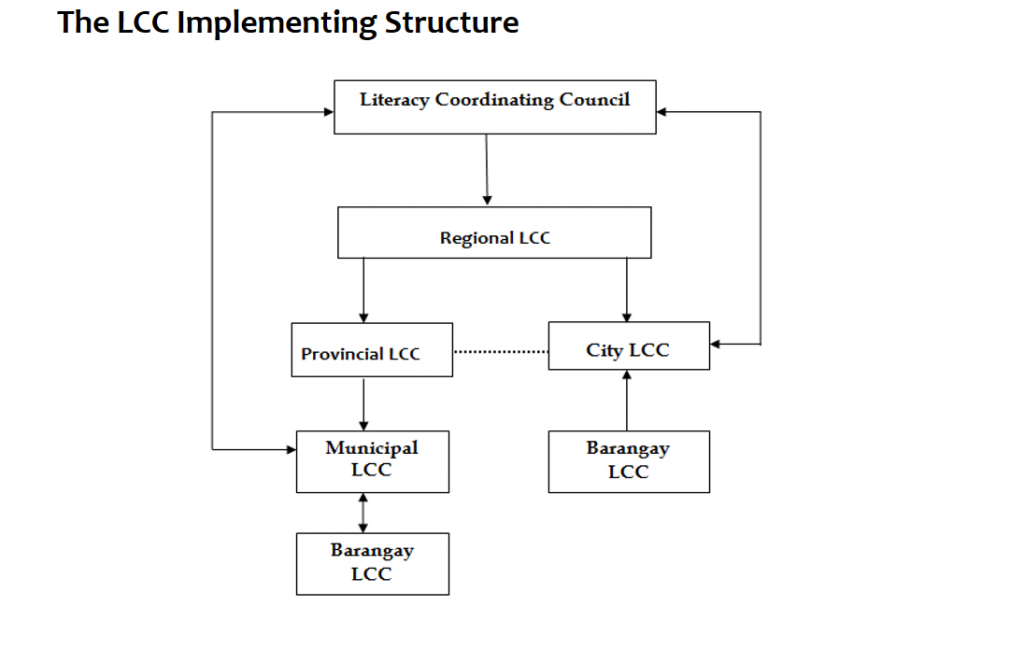
In line with the overlying philosophy of RA 7165 creating the Literacy Coordinating Council (LCC) which solicits the total commitment of all sectors from the national to local levels, corresponding cascading mechanisms responsible for planning and management are suggested:
- National Mechanism: The Literacy Coordinating Council
- Regional Mechanism: The Regional Literacy Coordinating Council
- Provincial Mechanism: The Provincial Literacy Coordinating Council
- Municipal Mechanism: The Municipal Literacy Coordinating Council
- City Mechanism: The City Literacy Coordinating Council
- Barangay Mechanism: The Barangay Literacy Coordinating Council
The organization, composition, and functions of these mechanisms are in accordance with the overall thrust of RA 7165 which is community-based planning and management of literacy projects, multi-level, inter-agency, and multi-sectoral.
There are two levels of organizational coordination – national and regional. Actual planning, implementation, monitoring, and evaluation tasks are at the provincial and municipal levels. The latter mechanisms are called the Provincial and Municipal Project Implementing Units (PIUs).
There are two suggested workflows: a) bottom-up approach which begins at the community level, leading up to the national level which is the Literacy Coordinating Council; and b) pursuant to the provisions of the 1991 Local Government Code, the PIUs enjoy autonomy and can link directly with LCC.
Every local government unit is suggested to have PIUs in the barangay, municipal, and provincial levels composed of local officials and representatives of organizations and associations from both government and non-government sectors. These units will be responsible for the overall planning, implementation, monitoring, and evaluation of literacy programs and projects. They will also take charge of resource generation, advocacy and social mobilization, and networking/linkaging.
Legal Bases for the Creation of Local LCCs
1. Administrative Order No. 324
Signed by Former President Fidel V. Ramos on April 15, 1997, mandating all concerned government agencies (GAs) and local government units (LGUs) to adopt the LCC Blueprint for Action as framework or guideline in developing policies and implementing programs and projects related to literacy.






 The Literacy Coordinating Council (LCC) Blueprint for Action is an action program for the attainment of the Philippines’ literacy goal: universalization of literacy in the country. The first Blueprint for Action was crafted in 1996 and officially adopted in 1997 through Administrative Order No. 324 (1997). It was formulated not only to serve as LCC’s strategic framework in developing policies and implementing programs towards eradication of illiteracy, but also to guide the Council’s other concerned entities such as other government agencies, local government units, and partners from civil society groups, among others.
The Literacy Coordinating Council (LCC) Blueprint for Action is an action program for the attainment of the Philippines’ literacy goal: universalization of literacy in the country. The first Blueprint for Action was crafted in 1996 and officially adopted in 1997 through Administrative Order No. 324 (1997). It was formulated not only to serve as LCC’s strategic framework in developing policies and implementing programs towards eradication of illiteracy, but also to guide the Council’s other concerned entities such as other government agencies, local government units, and partners from civil society groups, among others. The Literacy Coordinating Council recently held its National Literacy Conference in Imperial Palace Suite, Timog Avenue, Corner Tomas Morato Avenue, Quezon City, on September 27-29, 2011. The Conference, with the theme “Pursuing Community Development through Peace Literacy” was participated in by local government units officials, DepEd Alternative Learning System officials and teachers, non-government organizations representatives, Council representatives and technical advisory and working groups, and literacy stakeholders and advocates from all over the Philippines. Around 417 registered participants filled the Hall of the Imperial Palace Suite, excluding the LCC Secretariat and working committees Honored guests and speakers to the Conference included DepEd Undersecretary Rizalino Rivera as the keynote speaker, and Philippine Information Ageny Director General, Atty. Jose A. Fabia, among others.
The Literacy Coordinating Council recently held its National Literacy Conference in Imperial Palace Suite, Timog Avenue, Corner Tomas Morato Avenue, Quezon City, on September 27-29, 2011. The Conference, with the theme “Pursuing Community Development through Peace Literacy” was participated in by local government units officials, DepEd Alternative Learning System officials and teachers, non-government organizations representatives, Council representatives and technical advisory and working groups, and literacy stakeholders and advocates from all over the Philippines. Around 417 registered participants filled the Hall of the Imperial Palace Suite, excluding the LCC Secretariat and working committees Honored guests and speakers to the Conference included DepEd Undersecretary Rizalino Rivera as the keynote speaker, and Philippine Information Ageny Director General, Atty. Jose A. Fabia, among others.